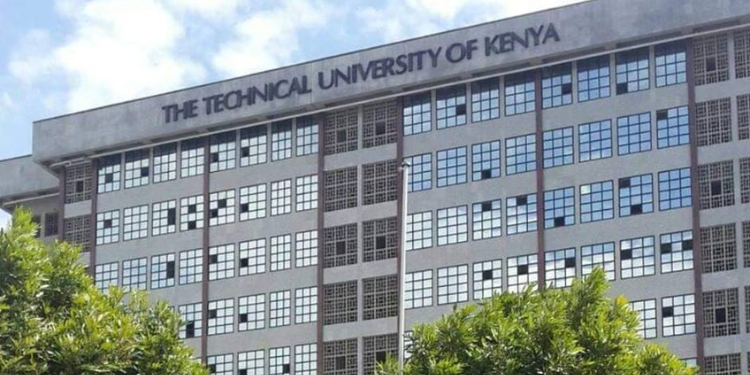News
Revealed: How Former Top TUK Officials Embezzled Sh245 Million Pension Funds

Senate probe exposes systematic looting of workers’ retirement savings as university bosses face accountability questions
A damning Senate investigation has blown the lid off a brazen embezzlement scheme that saw former top officials at the Technical University of Kenya (TUK) systematically loot Sh245 million in workers’ pension contributions, leaving hundreds of employees facing a bleak retirement.
The shocking revelations emerged during Senate Committee on Labour and Social Welfare hearings, where documents tabled painted a grim picture of deliberate financial misconduct that has destroyed the livelihoods of dedicated public servants who spent years contributing to what they believed was their secure retirement fund.
Between 2010 and 2013, staff diligently remitted Sh81.6 million in pension contributions while the university added Sh163.3 million, totaling Sh244.9 million that was deposited into a Kenya Commercial Bank savings account. By April 2013, the full amount sat intact in the account. However, within barely a month, the balance had mysteriously plummeted to just Sh9.5 million.
The account signatories reads like a who’s who of TUK’s leadership during that period: Professor Francis Aduol, who served as founding principal and later the university’s first vice chancellor; Professor Paul Shiundu, who acted as deputy vice chancellor; Professor Suki K.K Mwendwa, another acting deputy vice chancellor; Jamleck Kanambiu, the acting chief accountant; and Stanley M. Mwangi, the acting finance officer.
Charles Machira, chief executive of the Retirement Benefits Authority (RBA), delivered devastating testimony to senators, revealing that when TUK finally registered its Staff Retirement Benefits Scheme in November 2013, the account balance remained at the paltry Sh9.5 million. Shockingly, even this meager amount was never transferred to the pension scheme.
“A total of Sh244 million was collected, kept in a savings account which was not compliant with the RBA Act and by the time the retirement scheme was registered, the money had vanished,” Machira told the visibly stunned senators.
The investigation revealed that both Kenya Polytechnic University College, TUK’s predecessor, and TUK itself admitted to diverting the funds, euphemistically describing their actions as necessary due to “unavoidable circumstances.”
Current Vice Chancellor Professor Benedict Mwavu Mutua, squirming under intense senatorial questioning, was forced to concede the university’s culpability. “We accept that the law was broken,” he admitted, attempting to shift blame to the National Treasury’s alleged failure to disburse full funding to the institution.
The human cost of this financial malfeasance is devastating. Fred Sawenja, secretary of TUK’s chapter of the Universities Academic Staff Union, painted a heartbreaking picture of retirees facing poverty, scheme members dying while waiting for their pensions, and others developing psychological stress from the uncertainty.
The situation deteriorated so severely that by 2017, the RBA was forced to appoint an interim administrator, Octagon Pension Services Ltd, to investigate and recommend whether to revive or liquidate the scheme. The funding level had collapsed to a catastrophic 20 percent, far below the legally required 100 percent.
After years of legal battles, the High Court finally issued winding-up orders in 2024, effectively putting the final nail in the coffin of workers’ retirement dreams. The scheme currently holds just Sh755 million against outstanding liabilities of Sh4.3 billion, meaning the funding level stands at a dismal 17 percent.
The practical impact is devastating: a member entitled to Sh1 million in pension benefits can now only expect to receive Sh170,000.
Most of the account signatories have since retired or left the institution, with Professor Aduol notably securing appointment as a commissioner at the Independent Electoral and Boundaries Commission. Only one signatory remains at the university, though current officials have refused to name this individual.
The union has demanded that all persons of interest, including Professor Aduol, university secretary and Chief Legal Officer Ruth Kirwa, and bursar Ben Sanda, face thorough investigation and accountability for what they term “sins of commission or omission.”
This scandal represents more than mere financial mismanagement; it exemplifies a betrayal of public trust that has condemned hundreds of dedicated educators and support staff to poverty in their golden years. The systematic nature of the funds’ disappearance, coupled with the multiple high-level signatories involved, suggests coordinated action rather than administrative oversight.
As investigations continue, the affected workers and their families can only watch helplessly as their life savings vanish into the bureaucratic ether, victims of a system that failed to protect those who dedicated their careers to public service.
The TUK pension scandal serves as a stark reminder of the vulnerability of workers’ retirement savings and the urgent need for stronger oversight mechanisms to prevent such devastating breaches of fiduciary duty in Kenya’s public institutions.
Kenya Insights allows guest blogging, if you want to be published on Kenya’s most authoritative and accurate blog, have an expose, news TIPS, story angles, human interest stories, drop us an email on [email protected] or via Telegram
-

 News1 week ago
News1 week agoTHE FIRM IN THE DOCK: How Kaplan and Stratton Became the Most Scrutinised Law Firm in Kenya
-

 Investigations2 weeks ago
Investigations2 weeks agoMulti-Million Dollar Fraud: Three Kenyans Face US Extradition in Massive Cybercrime Conspiracy
-

 Economy1 week ago
Economy1 week agoIran Demands Arrest, Prosecution Of Kenya’s Cup of Joe Director Director Over Sh2.6 Billion Tea Fraud
-

 Business2 weeks ago
Business2 weeks agoA Farm in Kenya’s Rift Valley Ignites a National Reckoning With Israeli Investment
-

 Grapevine6 days ago
Grapevine6 days agoA UN Director Based in Nairobi Was Deep in an Intimate Friendship With Epstein — He Even Sent Her a Sex Toy
-

 Africa2 weeks ago
Africa2 weeks agoFBI Investigates Congresswoman Ilhan Omar’s Husband’s Sh3.8 Billion Businesses in Kenya, Somalia and Dubai
-

 News2 weeks ago
News2 weeks agoTragedy As City Hall Hands Corrupt Ghanaian Firm Multimillion Garbage Collection Tender
-

 Arts & Culture2 weeks ago
Arts & Culture2 weeks agoWhen Lent and Ramadan Meet: Christians and Muslims Start Their Fasting Season Together



















